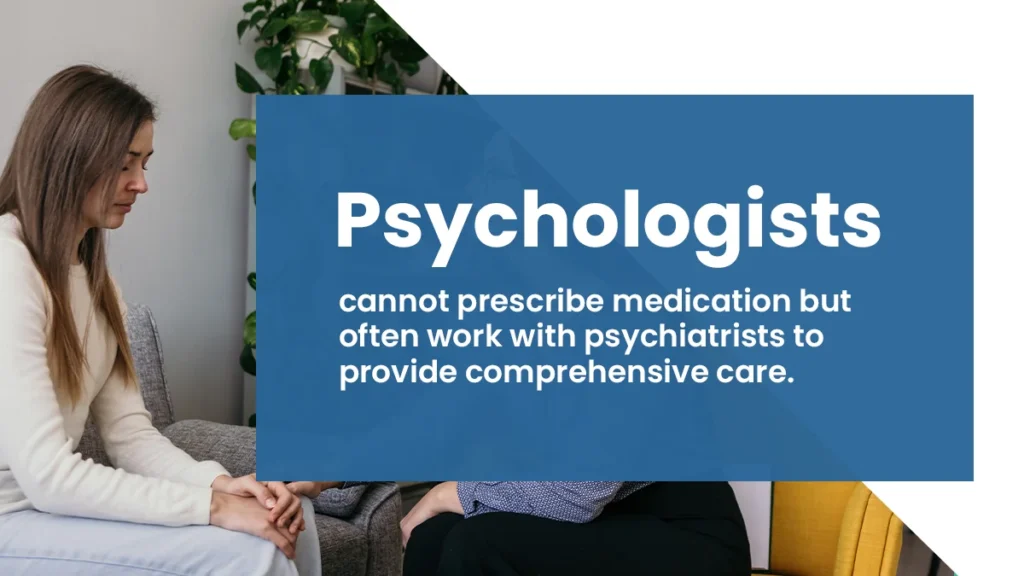Navigating the path to mental health help can feel overwhelming, but it’s essential to a healthier, happier life. Whether you’re struggling with anxiety, depression, or another mental health issue, knowing where to turn for support is essential.
In this blog, we’ll explore practical ways to access mental health help, including finding the right professionals, utilizing online resources, and understanding your options for therapy and support. By breaking down these steps, we aim to make seeking help more approachable and less daunting. Let’s take the first step towards a healthier, more balanced life together.
Key Takeaways
Mental illness is a significant concern in the United States, affecting millions of people each year. Here’s what you need to know:
- Contact mental health hotlines for immediate help and resources in times of crisis.
- Explore mental health apps and online therapy platforms for flexible, accessible care options.
- Incorporate self-care practices like exercise, healthy eating, and stress management into your routine.

If you or your family member need guidance dealing with mental health disorders, call The Haven Detox-New England at (844) 933-4145 for mental health care to boost recovery.
Recognizing When You Need Help
Understanding when you need help for your mental health is important for your well-being. Mental health issues can affect anyone, including men, women, children, and military veterans, and seeking support can be a significant step towards feeling better.
Signs And Symptoms
Identifying the signs and symptoms of mental disorders is the first step in seeking help. Common symptoms of mental illness include:
- Persistent feelings of sadness or anxiety.
- Withdrawal from friends and activities.
- Changes in sleep patterns.
- Trouble concentrating.
You might also notice physical symptoms like fatigue or headaches without a clear cause. If these symptoms last weeks or interfere with your daily life, you should consider contacting a professional counselor or a psychologist for medical care.
Types Of Mental Health Professionals
Mental health professionals come with different specializations and roles.
Psychiatrists
Psychiatrists are medical doctors who specialize in mental health. They can diagnose mental health conditions, recommend medicines, and offer treatment plans. They often work with patients who need medication for conditions, for example, depression, anxiety, substance use disorders, or bipolar disorder. Psychiatrists also provide therapy, but their main focus is on managing medication and complex mental health problems.
Psychologists
Psychologists have advanced degrees in psychology and are experts in assessing, diagnosing, and treating mental health issues. They use conversation or various forms of therapy, such as cognitive-behavioral therapy (CBT), to help people manage their problems. Psychologists cannot prescribe medication but often work with psychiatrists to provide comprehensive care.
Therapists And Counselors
Therapists and counselors offer confidential support through talk therapy. They help adults deal with stress, relationship issues, emotional distress, addiction to drugs and alcohol, and personal challenges.
Depending on their training and the needs of their customers, therapists might use different techniques. Therapists often focus on specific problems and provide strategies and tools to cope and improve mental well-being.
Social Workers
Social workers in mental health specialize in helping people overcome life challenges and access resources. They provide therapy, support clients in managing their mental health concerns, and connect them to community resources.
Social workers often work in various settings, including hospitals, schools, medical centers, and private practices. They play a vital role in helping young people navigate their mental health needs and improve their quality of life.
Finding The Right Mental Health Professional
Finding an accurate mental health professional is vital for effective care.
Assessing Your Needs
First, assess your needs. Think about what you want to achieve. Are you looking for therapy to manage anxiety, depression, substance abuse, or another condition? Do you need a specialist for a specific issue? Identify your goals and the type of support you require. Knowing whether you need individual therapy, group therapy, family therapy, or medication management helps narrow your search.
Researching Professionals And Services
Next, research professionals and services. Look for licensed therapists, counselors, psychiatrists, and behavioral health specialists in your area. Check their qualifications and areas of expertise.
Read reviews from other patients and verify their credentials. Websites, directories, and local support groups can provide valuable information. Consider the professional’s location and availability and whether they accept your insurance.
Questions To Ask Potential Providers
When you find potential providers, ask them key questions and inquire about their experience with your specific issue. Ask about their approach to treatment and what techniques they use.
Find out if they offer a free consultation to discuss your needs and goals. Also, ask about their fees and payment options. Ensure they are someone you feel comfortable with, as a good rapport is essential for successful therapy.
Steps To Take In An Emergency
When facing a mental health emergency, it’s important to stay calm and take clear steps to ensure safety and get appropriate help.
Recognizing A Mental Health Crisis
Recognizing a mental health crisis can be challenging but crucial. Look for signs such as severe mood swings, increased heart rate, extreme anxiety, or noticeable changes in behavior.
According to clinical research by The National Institute of Mental Health (NIMH) and Mental Health America (MHA), if someone talks about feeling hopeless, having suicidal thoughts, or showing self-harming behaviors, it’s important to act quickly. They may also lack interest in activities they once enjoyed or appear unusually withdrawn.
Emergency Hotlines And Helplines
It’s vital to have access to support in a mental health emergency. Contact emergency hotlines or helplines for immediate assistance. The National Suicide Prevention Lifeline (1-800-273-TALK) offers 24/7 support for those in crisis.
Additionally, text services like Crisis Text Line (text HOME to 741741) provide immediate help through text messages. Knowing these resources can make a big difference in a crisis.
Immediate Actions To Take
When dealing with a mental health emergency, stay calm and offer reassurance. Encourage the person to talk about their feelings and listen without judgment. If they are at risk of harming themselves or others, seek immediate help by calling 911 or going to the nearest emergency room. Ensure they are not left alone until professional help arrives. Document any signs of distress or changes in behavior to share with healthcare providers.
Frequently Asked Questions (FAQ)
What to do if someone is mentally unstable and won’t get help?
If someone is mentally unstable and refuses help, approach them with empathy and concern. Gently express your worries and suggest that seeking mental health treatment could improve your situation. Offer to help them find resources or accompany them to appointments.
Respect their autonomy but remain a supportive presence. In emergencies, contact a mental health crisis hotline or seek guidance from a primary care provider for further steps and clinical trials.
What are the first steps to seeking mental health help?
To seek mental health help:
- Start by acknowledging your need for support.
- Research local mental health professionals and services, such as therapists, counselors, or hotlines.
- Schedule an initial consultation to discuss your concerns and explore treatment options.
- Consider reaching out to friends or family for support and guidance.
- Remember that finding the right fit might take time, so be patient.
How can I find a qualified mental health professional?
To find a qualified mental health provider:
- Start by asking for recommendations from your primary care doctor, friends, or family.
- Use online directories from reputable organizations like the American Psychological Association or the National Alliance on Mental Illness.
- Check credentials and specializations to ensure they align with your needs.
- Read reviews and verify their licensing and certifications.
- Schedule a discussion to assess if you feel comfortable and supported by their approach.
Get Holistic Healing At The Haven Detox-New England
At The Haven Detox-New England, we believe in a compassionate and personalized approach to mental wellness. Whether you’re facing anxiety, depression, or stress, we’re here to guide you every step of the way. Our residential and medication-assisted treatment programs are designed to offer you a safe and supportive environment for recovery. Furthermore, our certified therapists provide empathetic counseling and evidence-based therapies tailored to your needs. Experience a holistic path to healing and embrace a brighter, more fulfilling life. Contact us to receive reliable mental health services at (844) 933-4145.
Verify Insurance
Let’s get you or a loved one help with a few simple steps.
-
Mental Illness Treatment
- Am I Depressed? Coping with the Blues
- Anxiety Disorders: Exploring the Different Types
- Anxiety No More: Your Guide To Effective Treatment
- Anxious Minds: A Dive Into Different Anxiety Disorders
- Balancing Mental Health And Work: FMLA Options Explained
- Biblical Wisdom For Mental Resilience
- Bipolar Disorder: Signs and Symptoms
- Bipolar II Disorder: Symptoms, Causes, and Treatments
- Blue Mood: A Closer Look at Depression
- Essential Steps To Mental Health Recovery Journey
- Explore The Risk Factors For Developing Mental Health Disorders
- FMLA And Mental Health Conditions
- From Hurt To Healing: How Does Bullying Affect Mental Health
- Genes to Environment: Causes of Depression
- Healing Hearts: Approaches to Treating Depression
- How Much Does Mental Health Disability Pay In 2024
- How Stress Can Have Negative Impacts On Your Mental Health
- How To Find Help For Mental Health
- How To Get Mental Health Help: A Comprehensive Guide
- Inside the Mind: Exploring the Depths of PTSD
- Insights On Mental Health Disabilities
- Mental Disability Benefits: How To Apply And What To Expect
- Mental Health in the Health Triangle: Achieving Balance
- Mental Health Stigma Examples: A Major Roadblock
- Mental Health Stigma Statistics: A Closer Look
- Navigating A Mental Health Crisis
- Navigating Emotional Trauma in Adulthood
- Outpatient Medical Detox: A Guide For Beginners
- Strategies For Improving Mental Health
- The Duration Of Inpatient Mental Health Stays
- The Key Stages Of Mental Health Recovery Journey
- The Mental Health Recovery Model: Path To Wellness
- Understanding Inpatient Mental Health Care
- Understanding Mental Health Well-being
- What Are The Key Signs Of Stress Affecting Mental Health
- What Does The Bible Say About Mental Health: Insights From Scripture
- What is Bipolar I Disorder: Strategies for Stability
- Why Someone Should Seek Professional Help For Mental Health Issues
- Mental Health Crisis: Key Insights
- Strategies For Student-Athlete Mental Wellness




